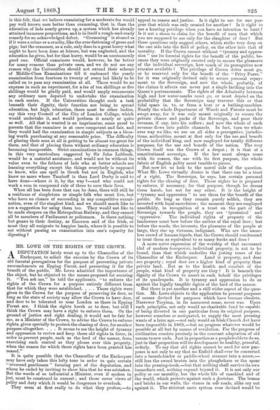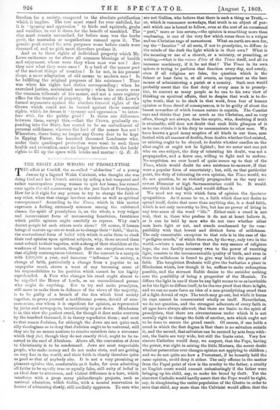MR. LOWE ON THE RIGHTS OF THE CROWN.
ADEPUTATION lately went up to the Chancellor of the Exchequer, to solicit the exercise by the Crown of its old forestal prerogatives for the purpose of preventing private encroachments on Epping Forest, and preserving it for the benefit of the public. Mr. Lowe admitted the importance of the object, but he objected to the means proposed for securing it. "You ask me," he told the applicants, "to enforce the rights of the Crown for a purpose entirely different from that for which they were established. . . . Those rights were given to the Crown for the purpose of preserving its deer, so long as the state of society may allow the Crown to have deer, and deer to be tolerated so near London as those in Epping Forest are. I think the rights harsh as to deer, but still I think the Crown may have a right to enforce them. On the ground of justice and right dealing, it would not be fair for me, as a Minister of the Crown, to advise the Crown to enforce rights, given specially to protect the chasing of deer, for another purpose altogether. . . . It seems to me the height of tyranny and oppression to revive and keep these old rights in force, in order to prevent people, such as the lord of the manor, from exercising such control as they please over this property, when the reason for which those rights have been granted has ceased."
It is quite possible that the Chancellor of the Exchequer may have only taken this lofty tone in order to quiz certain "reverend gentlemen" forming part of the deputation, and whom he ended by inviting to show him that he was mistaken. But the words of so influential a Minister, even if spoken in jest, must be construed in earnest ; and these cover views of polity and duty which it would be dangerous to overlook. They seem at first really to do what they profess,—to appeal to reason and justice. Is it right to use for one pur- pose that which was only created for another ? Is it right to use a hunting privilege when you have no intention to hunt? Is it not a sham to claim for the benefit of men that which you are supposed to use only for the slaughter of deer? But these questions only suggest others, which strike very deep on the one side into the field of policy, on the other into that of morality. If the Crown cannot without "tyranny and oppres- sion" use its forestal rights for the benefit of the public, be- cause they were originally created only to secure the pleasures of the individual sovereign, how much of its prerogative now remains available ? The privilege of Crown debts must go, or be reserved only for the benefit of the "Privy Purse," for it was originally devised only to secure personal repay- ment to the Sovereign, and now the whole, probably, of the claims it affects can never put a single farthing into the Queen's portemonnaie. The rights of the Admiralty between high and low water-marks must go, or must depend on the probability that the Sovereign may traverse this or that tidal space in, to, or from a boat or a bathing-machine. Nearly the whole Department of Woods and Forests must be swept away, for it was only meant originally to secure the private chases and parks of the Sovereign, and pour their revenue, if any, into his coffers ; and now the whole of such revenue flows into public channels. In fact, turn we what- ever way we like, we see on all sides a prerogative, jurisdic- tions, authorities, meant at first only for the use and benefit of the individual king, and now employed for totally different purposes, for the use and benefit of the nation. The very Crown itself was the Crown of a despot ; it is that of a constitutional sovereign. If the law must always cease with its reason, the use with its first purpose, the whole fabric of English polity must tumble to pieces.
But now let us look to the moral side of the question. What Mr. Lowe virtually denies is that there can be a trust of a right. The Sovereign, he says, has certain personal rights for the chasing of deer. Those rights he is prepared to enforce, if necessary, for that purpose, though he deems them harsh, but not for any other. It is the height of "tyranny and oppression" to use them for the benefit of the public. So long as they remain purely selfish, they are invested with legal sacredness ; the moment they are employed unselfishly, in recognition of a trust on the part of the Sovereign towards the people, they are 'tyrannical' and oppressive.' The individual rights of property of the landowner must bow before the antlers of the royal deer ; but before the needs, the interests, the pleasures of the people at large, they rise up virtuous, indignant. Who are the name- less crowd of human bipeds, that the Crown should condescend to treat them as equivalent to so many bucks and does ?
A more naïve expression of the worship of that sacrosanct idol of modern bourgeoisie, individual property, is not to be found, than that which underlies the jesting tones of the Chancellor of the Exchequer. Land is property, and deer are property ; royal deer are a higher kind of property than private land. But as to the health and comfort of the people, what kind of property are they ? It is beneath the dignity of the Crown to assert in such behalf the privileges of its quadrupeds. It is tyranny and oppression to do so against the legally tangible rights of the lord of the manor.
But there is yet another and a still wider aspect of the ques- tion. Mr. Lowe objects to the application to present purposes of means devised for purposes which have become obsolete.
Narrower Toryism, in its narrowest sense, never was. Upon such principles, not only would no charitable fund be capable of being diverted in one particular from its original purpose, however senseless or antiquated, to supply the most pressing wants of a later age,—not only would an Irish Church Act have been impossible in 1869,—but no progress whatever would be possible at all but by means of revolution. For the progress of civilization consists precisely in the constant adaptation of old means to new ends. Just in proportion as a people is able to do so, just in that proportion will its development be healthy, peaceful, orderly. To say that old rights cannot be used for new pur- poses is not only to say that no Enfield shall ever be converted into a breech-loader or paddle-wheel steamer into a screw,— still less the sword beaten into the ploughshare or the spear into the pruning-hook,--but that nothing shall survive its own immediate end, nothing expand beyond it. It is not only our polity or our morality, but the whole life of mankind and of
the world, which protests against such a doctrine. The beams and bricks in our walls, the stones in our roads, alike cry out against it. The strictest caste system ever devised would be freedom for a society, compared to the absolute petrifaction which it implies. The tree must stand for ever unfelled, for it is "tyranny and oppression" to birds and squirrels, grubs and woodlice, to cut it down for the benefit of mankind. The clay must remain untouched, for before man was the herbs grew, the mastodon or megatherium roamed upon it. The granite peak served its own purposes zeons before roads were dreamed of, and no pick must therefore profane it.
And as to those rights of individual property which Mr. Lowe enthrones so far above all common blessings of health and enjoyment, where were they when man was not ? Are they now what they were once ? Is a lord of the manor part of the ancient things of creation ? Is he not, in his present shape, a mere adaptation of old means to modern uses ? Is he fulfilling the original purposes of his existence ? Time was when his rights had duties corresponding ; when he exercised justice, maintained security ; when his courts were the common tribunals of his manor, and not a mere registry office for the transfer of property. Is there one of Mr. Lowe's formal arguments against the obsolete forestal rights of the 'Crown which could not be turned against those manorial rights, which he deems it tyranny and oppression" to inter- fere with for the public good ? Is there one difference between them, except this,—that the Crown, gradually ex- panding into the State, has ceased to be an embodiment of personal selfishness, whereas the lord of the manor has not ? Wherefore, there being no longer any Crown deer to be kept in Epping Forest, the hundred thousand Londoners who, under their quadruped protection were wont to seek there health and recreation, must no longer interfere with the lords' rights to fill up the space with bricks and mortar : Q. E. D.































 Previous page
Previous page